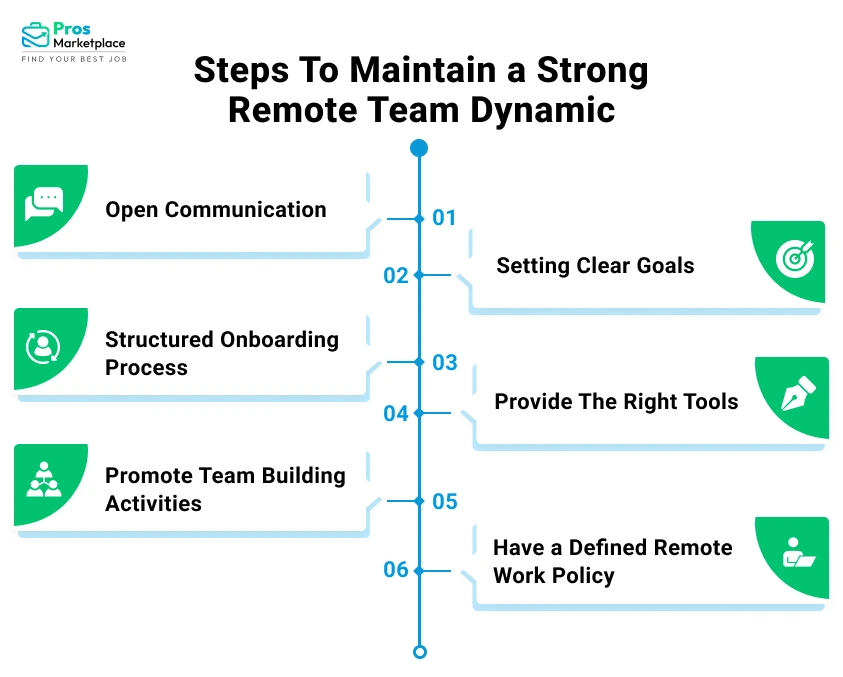Remote Work has evolved from a one-time thing to a long-term reality for the majority of businesses. The overall benefits, in terms of flexibility and wider pools of talent, are undeniable. However, building a remote work culture has become a rather challenging task without daily, face-to-face interactions. Moreover, Cultural nuances in remote teams can add layers of complexity because understanding various perspectives and ways of communication is more important now than ever before.
So, how do you keep your remote working culture thriving while keeping employees connected, engaged, and productive? This blog goes into the crucial practices that create and maintain strong team dynamics remotely, even when you are not in the same room. We will also cover the benefits of a strong remote culture. Whether you have a fully remote workforce or you’re managing a hybrid team, these insights will empower you to build a strong remote work culture.

How To Maintain a Strong Remote Team Dynamic
Open Communication
Clear and open communication is required by the remote teams to remain connected and productive. Tools such as Slack, Zoom, or Microsoft Teams allow for easy updates and seamless cooperation. Open conversations are encouraged, where team members are heard and valued to help them feel like they belong. This fosters a strong remote work culture. It also decreases the chances of miscommunication and improves the transparent nature of work.
Moreover, regular check-ins will help keep everyone in alignment and ensure that everyone is on the same page. For example, you can schedule weekly video calls to discuss ongoing projects, address concerns, and celebrate wins. Such touchpoints boost morale and allow for early identification of potential roadblocks, ensuring smoother project execution. This is crucial in a diversified, remote setting where understanding the cultural nuances in remote teams could further enhance collaboration.
Setting Clear Goals
It is an important step for a remote team to remain focused and productive to set clear goals and expectations. You can set specific objectives for every employee and help them maintain a sense of direction and accountability. Firm deadlines can be established for the completion of tasks. This will prevent delays and ensure that projects remain on track, further enhancing remote work culture.
Tools like Asana or Trello can be used for assigning tasks, monitoring progress, and providing visibility across the team. For instance, monthly targets can be set to break up larger goals into manageable steps. During team meetings, reviewing such targets keeps everyone informed about the progress and helps address challenges. This structured approach keeps employees motivated and aligned with overall business objectives, fostering accountability and collaboration.
Structured Onboarding Process
A structured onboarding process is a must for new hires to feel welcome and supported. Introduce them to the company culture by presentations or videos that would be about the mission, values, and workplace norms. For example, you have one-on-one sessions with key team members to help the new hire understand his role and team dynamics. Moreover, you can also give an onboarding checklist so that they become more confident of the tasks to be undertaken. This can include completing HR documentation, setting up workstations, and familiarization with software tools.
To further support the transition, create several training sessions that include training in software applications and practical examples. A buddy system can be implemented where an experienced employee is assigned as a mentor during the first week of the newly hired employee. This can help create a sense of belonging and offer an opportunity for new hires to ask questions while improving productivity. Moreover, addressing cultural nuances in remote teams can also ensure smooth onboarding.
Provide The Right Tools
Supplying the team with appropriate tools is also critical to ensure collaboration in remote work culture. Some project management software including Trello or Asana, to manage tasks and create deadlines with subsequent tracking. Trello makes use of boards and cards, visualizing all the tasks undertaken for easy follow-up on project status.
Moreover, you can use platforms like Google Drive or OneDrive. This will allow for the sharing and storage of documents. For real-time communication, tools like Slack or Microsoft Teams allow for instant messaging and video calls, which help team members interact seamlessly. Software like Time Champ can also help track productivity, keeping teams on schedule.
Promote Team Building Activities
Virtual team-building activities can enhance relationships and morale. Online quizzes, virtual coffee chats, or even games can make remote team members feel like a community. You can also have a monthly trivia session. This will engage employees and encourage friendly competition.
Moreover, these activities help give team members time off from work while allowing them to connect at a personal level. This will help resolve the cultural nuances in remote teams which in turn improves the overall environment in the workplace. In most cases, engaging in such activities frequently leads to better communication and a stronger team dynamic.
Have a Defined Remote Work Policy
Drafting a detailed remote work policy is an essential step for defining expectations and keeping productivity intact. This will cover working hours, communication protocol, and performance expectations. For example, you can have defined core hours during which everyone needs to be available online.
A well-designed policy also discusses work-life balance and provides rules on availability and time away from the office. Clear policies can remove confusion and get the team on the same page, knowing what they’re responsible for and what is expected of them.
By using these tactics, you will create a connected, productive, and engaged remote team that thrives anywhere.
Benefits of Building a Strong Remote Team
Building a strong remote team offers numerous advantages for employers. Here are some key benefits:
Access to Global Talent
Remote work enables employers to hire from a worldwide talent pool, enhancing recruitment options. This approach allows companies to find the best candidates regardless of location and strengthens the remote work culture.
Platforms like Pros Marketplace help employers source the best talent and ensure they hire the best for the particular need. Their global reach would also increase the quality of hiring while adding many diverse perspectives and skills to the organization.
Cost Savings
Remote work may save businesses significant amounts of money. For instance, Sun Microsystems saved $68 million in annual real estate expenses by embracing remote work. Companies can also reduce between $20,000 and $37,000 per employee annually by making a full shift to telecommuting. Such savings are made from the reductions in office space, utilities, and other overheads. Businesses can, therefore, reap immense financial benefits from embracing remote work without losing any productivity.
Reduced Absenteeism
Providing remote working opportunities often reduces absenteeism. Most people can work more freely around personal commitments and health issues, making them increasingly available and productive. Flexibility in working hours results in reduced stress, improved satisfaction, and enhanced work-life balance for employees. As a result, companies can reap significant financial benefits while maintaining productivity by embracing remote work.
Conclusion
Developing and maintaining a strong remote work culture requires intentional strategies to facilitate communication, establish clear goals, and provide the right tools. Employers can build a connected, productive, and engaged remote team by implementing open communication channels and a defined remote work policy.
This helps to strengthen the dynamics of the team, besides other important advantages like having global talent at your doorstep, saving costs, and less absenteeism. Adopting such practices is the key to a thriving remote team, no matter where in the world.







